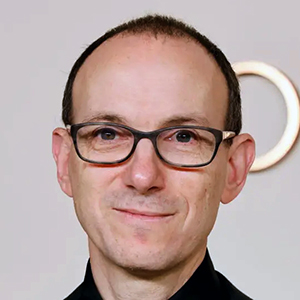
Alex David
Bank Street School for Children '86
It took me many years of writing and failing before I had this experience with this film, but I kept going. That’s part of the process I needed to really grow. It's like when you exercise: you literally tear your muscles in order to get them stronger.
When Alex David walked the halls of Bank Street’s School for Children in the 1980s, he was already beginning a path that would one day take him to the Academy Awards. Now a writer and teacher based in Frankfurt, Germany, Alex credits Bank Street with giving him his start as a storyteller.
After graduating from Wesleyan University and later earning his MFA from the American Film Institute, Alex spent his early career working as a screenwriter in Los Angeles. His journey then took him abroad when his wife accepted a position at a German cancer research institute, Deutsches Krebsforschungszentrum, and the family relocated to Germany. There, Alex has continued to write while also teaching.
Recently, his work drew global recognition: he co-wrote the feature film September 5, which tells the story of the 1972 Munich Olympics hostage tragedy through the eyes of the ABC Sports team thrust into reporting on it. The screenplay went on to receive an Oscar nomination for “Best Original Screenplay” at the 97th Academy Awards.
We sat down with Alex to discuss the film, his career, and lessons for today’s students.
How did you get involved in September 5?
The idea was to do something for the 50th anniversary of the hostage situation at the Munich Olympics. One of the people the original writing team spoke to was an American sports journalist who switched from covering the Olympics to covering the crisis. Since the original script was written in German by a German and a Swiss writer, they brought me in for an American perspective. I used Google Translate, and my wife to turn the script into English, and then I spent a year and a half working with the other writers on the script.
What was the process like?
I really enjoyed it. The director was incredibly open to ideas. We all wanted the best script, so we could argue about things without ego. It was about what we thought was best for the work.
At first, we didn’t have anyone to distribute it in the US. I thought it would go straight to streaming. It was invited to the Venice Film Festival, but not in the main competition. We had a great screening there, and everyone loved it. We screened a week later in Telluride, and then, because of these great reviews, Paramount Pictures decided they not only would distribute it in the US, but they would try and do an Oscar push. It worked.
What was your experience like during awards season?
I loved meeting the other writers. I met the writer/director of The Wild Robot, and I have kids who read the book and love the movie. The Academy Awards are just crazy. The whole experience was quite surreal and incredible, with all these stars just walking by.
What advice would you give to today’s School for Children alumni?
For me, what might have been useful is to appreciate the value of failing. Failing is not necessarily a bad thing. You need it to create interesting work. It took me many years of writing and failing before I had this experience with September 5, but I kept going. That’s part of the process I needed to really grow. It’s like when you exercise: you literally tear your muscles in order to get them stronger. I think that’s an important thing that I’m still trying to learn, and that I wish I had known even more when I was younger—that setbacks were actually what would make me a better artist.
Check out this clip to hear more from our interview with Alex, including some of his favorite School for Children memories.